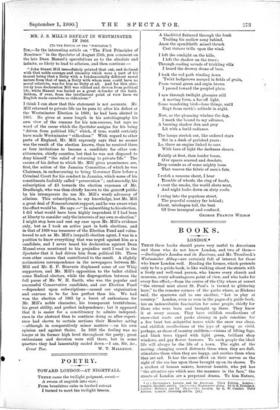MR. J. S. MILL'S DEFEAT IN WESTMINSTER IN 1868.
[To THE EDITOR OP THE "SPECTATOR"]
Sin,—In the interesting article on "The First Principles of Nescience " in the Spectator of August 25th, you comment on the late Dean Mansel's speculations as to the absolute and infinite, as likely to lead to atheism, and then continue :—
" John Stuart Mill immediately pointed that out, and declared with that noble courage and sincerity which were a part of his inmost being that a Deity with a fundamentally different moral nature from that of man, a Deity with whom man could have no moral relations, was for him no Deity at all. And for this abso- lutely true declaration Mill was vilified and driven from political life, while Mansel was hailed as a great defender of the faith. Seldom, if ever, from the intellectual point of view have we English made ourselves so ridiculous."
I think I can show that this statement is not accurate. Mr.
Mill returned to private life (as he puts it) after his defeat at the Westminster Election in 1868; he had been elected in
1865. He gives at some length in his autobiography his own view of the reasons for his non-success, but says no
word of the cause which the Spectator assigns for his being "driven from political life," which, if true, would certainly
have made Westminster "ridiculous." With regard to other parts of England, Mr. Mill expressly says that no sooner was the result of the election known, than he received three or four invitations to become a candidate for other con- stituencies, chiefly counties, but that he was not disposed to deny himself " the relief of returning to private life." The causes of his defeat to which Mr. Mill gives prominence are, first, the action of the Jamaica Committee, of which he was Chairman, in endeavouring to bring Governor Eyre before a Criminal Court for his conduct in Jamaica, which some of his constituents foolishly called " persecution " ; and secondly, his subscription of 25 towards the election expenses of Mr. Bradlaugh, who was then chiefly known to the genera public by his intemperate (to use Mr. Mill's word) advocacy of atheism. This subscription, to my knowledge, lost Mr. Mill
a great deal of Nonconformist support, and he was aware what the effect would be. He says :—" In subscribing to his election, I did what would have been highly imprudent if I had been at liberty to consider only the interests of my own re-election." I might atop here and rest my case upon Mr. Mill's evidence
only, but as I took an active part in both elections, and in that of 1868 was treasurer of the Election Fund and volun-
teered to act as Mr. Mill's (unpaid) election agent,. I was in a position to know everything that was urged against him as a candidate, and I never heard his declaration against Dean Mansel even mentioned to his prejudice until I read in the Spectator that it had driven him from political life. There
were other causes that contributed to the result. A slightly acrimonious correspondence in the newspapers between Mr.
Mill and Mr. E. P. Bouverie displeased some of our Whig supporters, and Mr. Mill's opposition to the ballot. chilled some Radical electors, while the disproportion between the full purse of Mr. W. H. Smith, who was the popular and successful Conservative candidate, and our Election Fund —dependent upon subscriptions—caused our organisation and canvass to be far less perfect than his. We had won the election of 1865 by a burst of enthusiasm for Mr. Mill's noble character, his transparent truthfulness, his great ability, and perfect independence; but it appeared that it is easier for a constituency to admire independ- ence in the abstract than to continue doing so after experi- ence had shown to certain sections their Member acting —although in comparatively minor matters — on his own opinion and against theirs. In 1868 the feeling was no longer at its former high level throughout the party; great enthusiasm and devotion were still there, but in some quarters they had lamentably cooled down.—I am, Sir, Stc.,


































 Previous page
Previous page